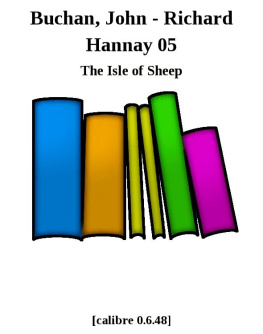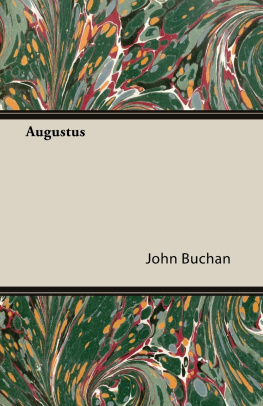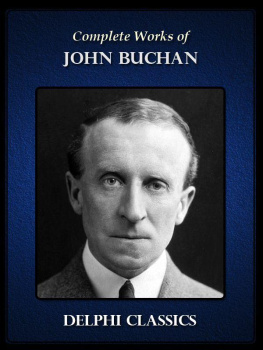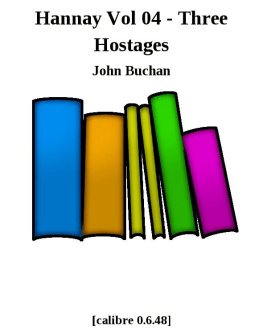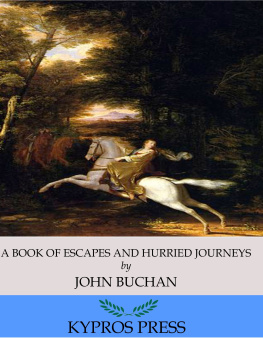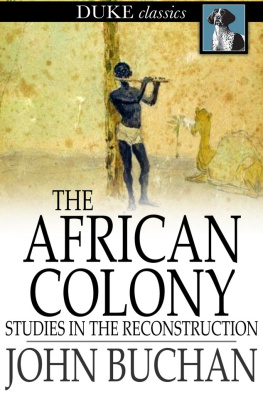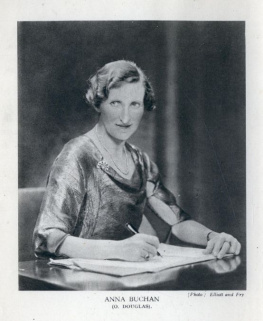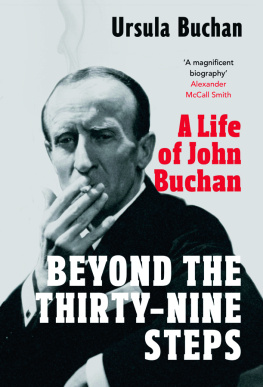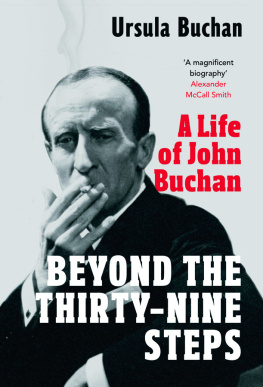John Buchan - The isle of Sheep
Here you can read online John Buchan - The isle of Sheep full text of the book (entire story) in english for free. Download pdf and epub, get meaning, cover and reviews about this ebook. genre: Art / Prose. Description of the work, (preface) as well as reviews are available. Best literature library LitArk.com created for fans of good reading and offers a wide selection of genres:
Romance novel
Science fiction
Adventure
Detective
Science
History
Home and family
Prose
Art
Politics
Computer
Non-fiction
Religion
Business
Children
Humor
Choose a favorite category and find really read worthwhile books. Enjoy immersion in the world of imagination, feel the emotions of the characters or learn something new for yourself, make an fascinating discovery.
- Book:The isle of Sheep
- Author:
- Genre:
- Rating:4 / 5
- Favourites:Add to favourites
- Your mark:
- 80
- 1
- 2
- 3
- 4
- 5
The isle of Sheep: summary, description and annotation
We offer to read an annotation, description, summary or preface (depends on what the author of the book "The isle of Sheep" wrote himself). If you haven't found the necessary information about the book — write in the comments, we will try to find it.
The isle of Sheep — read online for free the complete book (whole text) full work
Below is the text of the book, divided by pages. System saving the place of the last page read, allows you to conveniently read the book "The isle of Sheep" online for free, without having to search again every time where you left off. Put a bookmark, and you can go to the page where you finished reading at any time.
Font size:
Interval:
Bookmark:
Contents
Fosse
Laverlaw
The Island of Sheep
TO
J.N.S.B.
WHO KNOWS THE NORLANDS AND THE WAYS OF THE WILD GEESE
I have never believed, as some people do, in omens andforewarnings, for the dramatic things in my life have generallycome upon me as suddenly as a tropical thunderstorm. But I haveobserved that in a queer way I have been sometimes prepared forthem by my mind drifting into an unexpected mood. I wouldremember something I had not thought of for years, or startwithout reason an unusual line of thought. That was what happenedto me on an October evening when I got into the train atVictoria.
That afternoon I had done what for me was a rare thing, andattended a debate in the House of Commons. Lamancha was to make afull-dress speech, and Lamancha on such an occasion is worthhearing. But it was not my friend's eloquence that filled my mindor his deadly handling of interruptions, but a reply which theColonial Secretary gave to a question before the debate began. Aname can sometimes be like a scent or a tune, a key tolong-buried memories. When old Melbury spoke the word 'Lombard,'my thoughts were set racing down dim alleys of the past. Hequoted a memorandum written years ago and incorporated in thereport of a certain Commission; 'A very able memorandum,' hecalled it, 'by a certain Mr. Lombard,' which contained the pointhe wished to make. Able! I should think it was. And the writer!To be described as 'a certain Mr. Lombard' showed how completelythe man I once knew had dropped out of the world's ken.
I did not do justice to Lamancha's speech, for I thought ofLombard all through it. I thought of him in my taxi going to thestation, and, when I had found my compartment, his face camebetween me and the pages of my evening paper. I had not thoughtmuch about him for years, but now Melbury's chance quotation hadstarted a set of pictures which flitted like a film series beforemy eyes. I saw Lombard as I had last seen him, dressed a littledifferently from to-day, a little fuller in the face than we leankine who have survived the War, with eyes not blurred frommotoring, and voice not high-pitched like ours to override thedin of our environment. I saw his smile, the odd quick lift ofhis chin--and I realized that I was growing old and had left somewonderful things behind me.
The compartment filled up with City men going home to theircomfortable southern suburbs. They all had evening papers, andsome had morning papers to finish. Most of them appeared to makethis journey regularly, for they knew each other, and exchangedmarket gossip or commented on public affairs. A friendlyconfidential party; and I sat in my corner looking out of thewindow at another landscape than what some poet has called 'smokydwarf houses,' and seeing a young man's face which was verydifferent from theirs.
Lombard had come out to East Africa as secretary to aGovernment Commission, a Commission which he very soonmanipulated as he pleased. I met him there when I was sent up ona prospecting job. He was very young then, not more thantwenty-five, and he was in his first years at the Bar. He hadbeen at one of the lesser public schools and at Cambridge, hadbeen a good scholar, and was as full as he could hold of books. Iremembered our first meeting in a cold camp on the Uasin Gishuplateau, when he quoted and translated a Greek line about thebitter little wind before dawn. But he never paraded hislearning, for his desire was to be in complete harmony with hissurroundings, and to look very much the pioneer. Those were theold days in East Africa, before the 'Happy Valley' and theremittance man and settlers who wanted self-government, andpeople's hopes were high. He was full of the heroes of the past,like Roddy Owen and Vandeleur and the Portals, and, except thathe was a poor horseman, he had something in common with them.With his light figure and bleached fair hair and brown skin helooked the very model of the adventurous Englishman. I thoughtthat there might be a touch of the Jew in his ancestry--somethinghigh-coloured and foreign at any rate, for he was more expansiveand quickly fired than the rest of us. But on the whole he was asEnglish as a Hampshire water-meadow....
The compartment was blue with pipe-smoke. My companions weretalking about rock-gardens. The man in the corner opposite me wasapparently an authority on the subject, and he had much to sayabout different firms of nursery gardeners. He was blond, plump,and baldish, and had a pleasant voice whose tones woke arecollection which I could not fix. I thought that I had probablyseen him at some company meeting....
My mind went back to Lombard. I remembered how we had sat on arock one evening looking over the trough of Equatoria, and, asthe sun crimsoned the distant olive-green forests, he had told mehis ambitions. In those days the after-glow of Cecil Rhodes'sspell still lay on Africa, and men could dream dreams. Lombard'swere majestic. 'I have got my inspiration,' he told me. His oldhankerings after legal or literary or political success at homehad gone. He had found a new and masterful purpose.
It was a very young man's talk. I was about his own age, but Ihad knocked about a bit and saw its crudity. Yet it most deeplyimpressed me. There were fire and poetry in it, and there wasalso a pleasant shrewdness. He had had his 'call' and washastening to answer it. Henceforth his life was to be dedicatedto one end, the building up of a British Equatoria, with thehighlands of the East and South as the white man's base. It wasto be both white man's and black man's country, a new kingdom ofPrester John. It was to link up South Africa with Egypt and theSudan, and thereby complete Rhodes's plan. It was to be a magnetto attract our youth and a settlement ground for our surpluspopulation. It was to carry with it a spiritual renaissance forEngland. 'When I think,' he cried, 'of the stuffy life at home!We must bring air into it, and instead of a blind alley give 'emopen country....'
The talk in the compartment was now of golf. Matches werebeing fixed up for the following Sunday. Myvis--vis had evidently some repute as a golfer,and was describing how he had managed to lower his handicap. Golf'shop' is to me the most dismal thing on earth, and I shut myears to it. 'So I took my mashie, you know, my littlemashie'--the words seemed to have all the stuffiness of whichLombard had complained. Here in perfection was the smug suburbanlife from which he had revolted. My thoughts went back to thathilltop three thousand miles and thirty years away....
Next pageFont size:
Interval:
Bookmark:
Similar books «The isle of Sheep»
Look at similar books to The isle of Sheep. We have selected literature similar in name and meaning in the hope of providing readers with more options to find new, interesting, not yet read works.
Discussion, reviews of the book The isle of Sheep and just readers' own opinions. Leave your comments, write what you think about the work, its meaning or the main characters. Specify what exactly you liked and what you didn't like, and why you think so.

